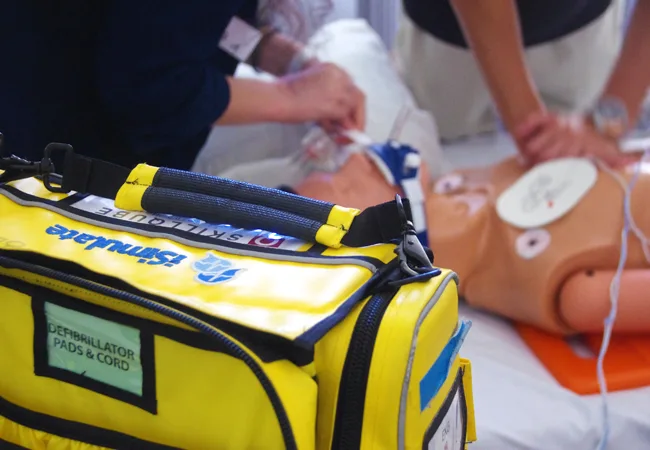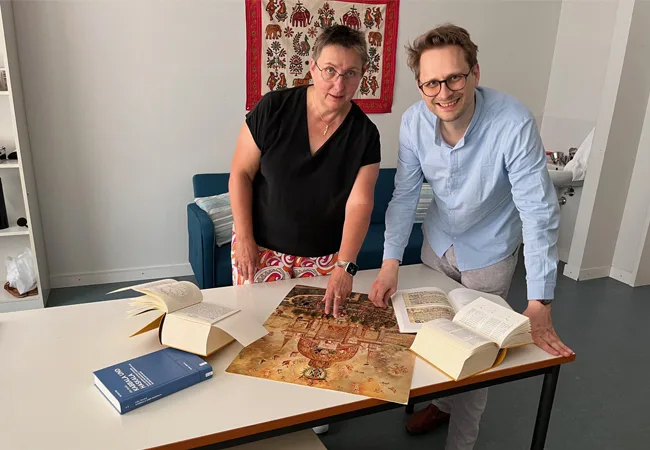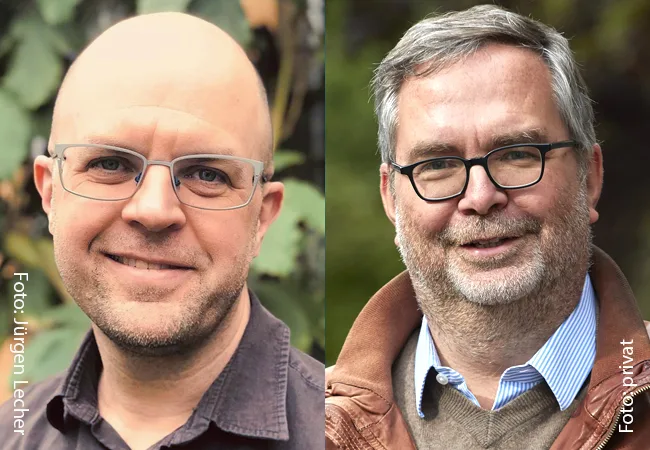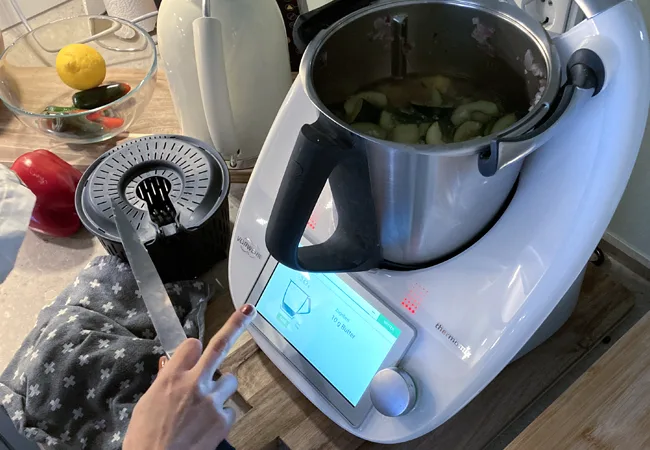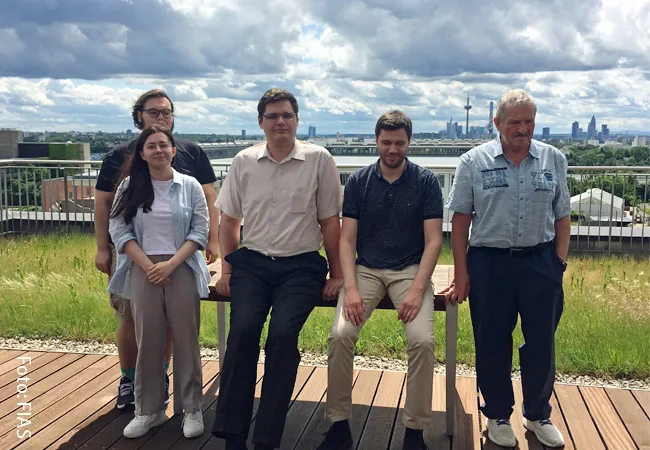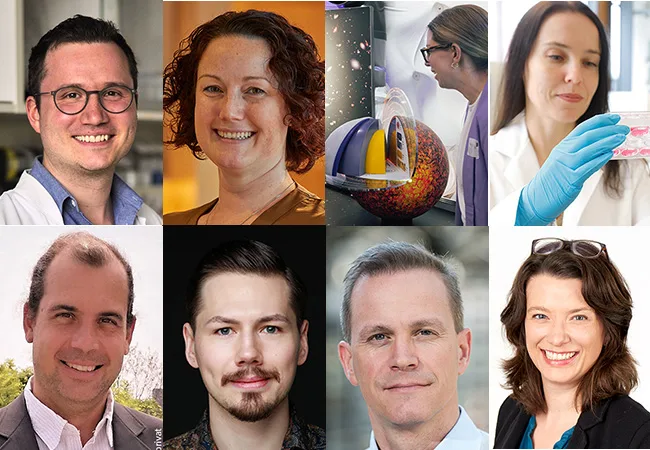
Christine Wenona Hoffmann has always seen herself as somewhat of a cross-border commuter, and not just since assuming the „Practical Theology“ professorship at Goethe University Frankfurt’s Faculty of Protestant Theology earlier this year. Her research focuses on how ecclesiastical and religious activity expresses itself and becomes visible in daily life – and how to investigate and comprehend this, using scientific methods.
Such a boundary also shaped Hoffmann’s childhood and adolescence: although she and her siblings had been baptized, as the children of two physicians, they grew up in a household characterized by rational and scientific thought, with no church connection. „It was always clear that we children would also study medicine,“ says Hoffmann, who – back then – crossed that boundary only in conversations and discussions with her religion teacher.
From medicine to theology
The first time she experienced any doubts about this life path came after she had been assigned her place at medical school and was completing the mandatory three-month nursing internship: „Case solved, next please … It seemed to me as if people were being rushed through this medical system as if on an assembly line. That’s not what I had had in mind,“ Hoffmann recalls. At the same time, as an intern, her scope of action was so limited that she almost automatically took on the tasks of a pastor and finally decided – again following a discussion with her former religion teacher – to study theology.
During her studies, she both encountered and discovered denominational boundaries. First between Catholic and Protestant theology, during her year abroad in Rome, where she not only studied at the small faculty of the Reformed Waldensian Church, but also was the only one, among 200 candidates for the priesthood and a few nuns, not wearing a habit at the papal universities „Gregoriana“ and „St. Thomas Aquinas“. Hoffmann went on to discover another boundary, this time between the Anglican and Methodist Churches, during her stay in Cambridge.
She gave in to her inclination to explore and approach matters scientifically. Having obtained her diploma and following her first theological exam, she decided to pursue a doctorate. „The phenomenon of ‚preaching‘ has fascinated me right from my first semester. I wondered how the content of sermons relates to the content of the texts they convey, and how I could get that biblical content across to the congregation without boring them with lecture-like deliveries.“ Once again, her approach moved along a borderline: that between the theological disciplines of exegesis (i.e. the scientific interpretation of the Bible) and homiletics (i.e. the teaching of sermons). Ever since then, Hoffman knows that in practical theology, she has found the field best suited to her research urge.
Hoffmann went on to complete her vicariate – a prerequisite both for her studies and the second theological exam as well as a pastorate – in a Mannheim parish, home to many low-income households, and where, as a result, diaconia (charity, active charity) plays an important role. Here, „in real life,“ she also received decisive impulses for her research, ones that extended beyond her doctorate. As a vicar, she often provided pastoral support: at their request, she accompanied her parishioners spiritually and stood by them, including – if they so desired – in different types of life crises and situations.
Pastoral counselor and scientist
„As a vicar, I was often also a pastor to people in need of diaconia. At the same time, I was a scientist, carefully immersed in my research,“ Hoffmann recalls. This led her to notice another boundary: Diaconia had not played a role in her research on pastoral care to date, whereas within diaconics (research on diaconia), hardly anyone had yet taken a look at pastoral aspects. The two fields of activity, she says, stand unconnected next to each other even when it comes to the practice of Protestant church congregations.
After spending several years on the borderlines between everyday life in congregations, the official Protestant church and theological science, since taking on the W1 professorship at Goethe University Frankfurt in early 2023, Hoffmann has fully arrived in academia. Her research here centers on the relationship between pastoral care and diaconia in particular: using transcripts of pastoral conversations, she is investigating the issues that preoccupy those seeking advice – especially those belonging to marginalized social groups – and the impact of pastoral care. „I also ask: ‚How can pastoral care and diaconia be meaningfully linked to one another?‘ After all, the reality in Germany is that although diaconia and the church belong together, they operate largely independently.“
Hoffmann particularly enjoys the fact that she doesn’t have to choose between research and teaching here at university: „Doing theological research is wonderful, but being able to teach students gives me most joy. Teaching allows me to accompany people as they train their own theological thinking and reflection. Being able to prepare them to do well at their job later is a wonderful privilege.“ She also enjoys it when her courses cross boundaries between religions and subjects, as was the case during her recent pastoral care seminar, attended by six Muslim women.
Stefanie Hense


